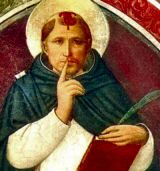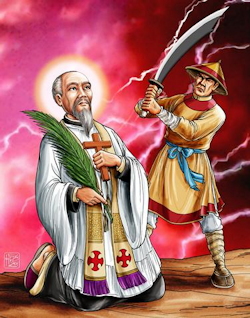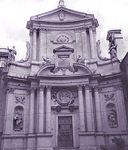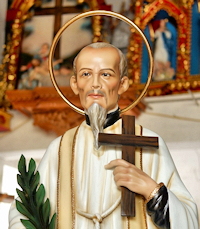Lent: April 6th
Thursday of the Fifth Week of Lent
Other Commemorations: St. Peter of Verona (RM); St. Phaolo Le Bao Tinh (RM)
» Enjoy our Liturgical Seasons series of e-books!
"Then in anger his master handed him over to the torturers until he should pay back the whole debt. So will my heavenly Father do to you, unless each of you forgives your brother from your heart (Mt. 18:35)." No one is merciful like God, and no one pardons as God pardons. The mercy of the Jews was confined to forgiving seven times. Jesus desires that His disciples should always forgive — even to seventy times seven times.
| The Station in Rome is in the church of St. Apollinaris, who was a disciple of St. Peter, and afterwards bishop of Ravenna. He was martyred. The church was founded in the early Middle Ages, probably in the 7th century. |  |
Meditation
We must forgive our neighbor always. This fraternal charity is the source of strength among the members of the Mystical Body: "If two of your shall consent upon earth concerning anything whatsoever they shall ask, it shall be done to them by my Father". This charity should animate us in giving fraternal correction, which should always be free from all vanity, self-love and desire to humiliate and defame.
The Church dispenses Christ's forgiveness through the power of the keys: "whatsoever you shall loose upon earth shall be loosed also in heaven". Christ's pardon of us is limitless. Just as the small quantity of oil, increasing miraculously at the word of Elias, enabled the poor widow to pay all her debts, so the infinite merits of Christ enable us to expiate all our sins.
Love of God and of neighbor imposes on us constant self-denial and self-mastery. Only love working through mortification will enable us to ascend the "holy hill" and dwell in "God's tabernacle".
Excerpted from The Cathedral Daily Missal by Right Rev. Msgr. Rudolph G. Bandas
Things to Do:
- Discuss the idea of forgiveness with your children — emphasizing with today's Gospel that Christ's forgiveness is limitless to those who humbly repent of their offenses against Him. Ask them ways in which they practice this virtue every day, with their sisters and brothers, with their parents, and with their friends.
- Throughout this third week of Lent, often the time when children begin to lose focus or weary of this penitential season, give them something tangible to work on, such as a Lenten Scrapbook, an ongoing activity that will engage their minds and stretch their creativity in putting their faith into pictures.
St. Peter of Verona
 Peter entered the Dominican Order in 1221, the year when St. Dominic died. He was a zealous preacher, and as Inquisitor converted many heretics. While attending school at the age of seventeen, he was asked by his uncle, a heretic, what he was learning. Candidly the boy replied, "The Apostles' Creed." Neither threats nor honeyed words from father and uncle were able to shake the boy's steadfast faith. Years later, when death was near, he once more recited the Apostles' Creed that he prayed so courageously in his youth. The mortal stab soon fell, and he received the martyr's crown.
Peter entered the Dominican Order in 1221, the year when St. Dominic died. He was a zealous preacher, and as Inquisitor converted many heretics. While attending school at the age of seventeen, he was asked by his uncle, a heretic, what he was learning. Candidly the boy replied, "The Apostles' Creed." Neither threats nor honeyed words from father and uncle were able to shake the boy's steadfast faith. Years later, when death was near, he once more recited the Apostles' Creed that he prayed so courageously in his youth. The mortal stab soon fell, and he received the martyr's crown.
—Excerpted from The Church's Year of Grace, Pius Parsch
Patronage: Inquisitors.
Symbols and Representation: Dominican with a large knife in or splitting his head; holding a knife; man with a knife in his head and a sword in his breast.
Highlights and Things to Do:
- As he lay dying, it is said, Peter wrote the word Credo on the ground with his own blood. To us also may the Creed be a source of blessing in life and in death! To that end we might occasionally meditate on one or another of its articles. Devoutly, reverently the words should pass our lips, especially at Mass. Remember that martyrs' blood has flowed for all its phrases.
- Read more about St. Peter of Verona. Also visit this site for more information.
- Read "Glory of the Preachers”: St. Peter of Verona at Crisis Magazine.
St. Phaolo Le Bao Tinh
Phaolo was born in 1793 at Trinh-Ha village, Thanh Hoa Province, now Vietnam, to wealthy parents. As a child he studied under a local Confucian scholar, until his parents sent him at twelve years of age to the Catholic seminary at Ke-Vinh.
The seminary described Phaolo as prayerful, ascetical and studious. He enjoyed reading the lives of saints and reminded everyone that they also were called to be saints. He felt called to live as a hermit and left the seminary to live in a cave, surviving on rice and fruit, passing his days in prayer and mortification.
The local Bishop then asked Phaolo to help in the work of bringing missionary priests back to the area. After this, he settled down in the mountains of Laos, mixing missionary work with being a reclusive hermit.
When persecution of Christians broke out in 1841, Phaolo was arrested by government officials and he spent the next seven years in prison at Hanoi. Shortly after receiving the death sentence he wrote to a seminarian describing his experience in prison:
"I, Paul, bound in chains for the sake of Christ, send to you from prison salutations which are many and final.… The prison is truly a living example of hell: to chains, shackles and manacles, are added anger, vengeance, lies, obscene conversations, brawls, evil acts, swearing, slander, plus boredom, sadness, mosquitoes and flies….I write these things so that your hearts might burst with desire to be martyrs, and that your prayers might strengthen me, who lives in the arena of combat."
 Emperor Thieu Tri in 1848, commuted Phaolo’s sentence from death to perpetual exile in Phu Yen Province. At the end of the same year the new Emperor, Tu Duc, granted an amnesty to all exiles.
Emperor Thieu Tri in 1848, commuted Phaolo’s sentence from death to perpetual exile in Phu Yen Province. At the end of the same year the new Emperor, Tu Duc, granted an amnesty to all exiles.
Phaolo then travelled to the seminary at Ke-Vinh, where he renewed his studies, later being ordained a priest.
After exercising his priestly ministry until 1855, some mandarins complained to the governor about Christians and Phaolo was arrested again. For working as a priest, he was classed as a criminal and was sentenced to be decapitated. Early next day he was led to the place of execution. His last words were: "The religion of the Heavenly Master is perfectly true, even though our king and the sovereigns of other nations persecute it and wish to destroy it. But this religion will be victorious, and in the future it will count more adherents than it ever has had in the past." The executioner then came with his sword and the death sentence was carried out.
Overall, St Paul’s spirituality had centred on the Cross of Jesus and the practice of prayer and asceticism. St Paul Le-Boa Tinh was canonized a saint by Pope John Paul II in 1988.
—Adapted from Prayers4Reparation's Blog
Highlights and Things to Do:
- Phaolo Le Bao Tinh was a Vietnamese priest. He wrote a letter to the seminary of Ke Vinh in 1843 detailing the sufferings of Christian prisoners. He himself was martyred on 6 April 1857. He was canonized in 1984 by Pope John Paul II. Read his letter.

Wednesday of the 5th Week of Lent
Station with San Marcello al Corso (St. Marcellus at the Corso):
The Station today is at the church of St. Marcellus at the Corso. Legend claims that Pope St. Marcellus (308-309) was sentenced by Emperor Maxentius to look after the horses at the station of the Imperial mail on the Via Lata, where the Via del Corso now lies. He was freed by the people, and hidden in the house of the Roman lady Lucina (see also San Lorenzo in Lucina). He was rearrested, and imprisoned in the stables.
For further information on the Station Churches, see The Stational Church.






